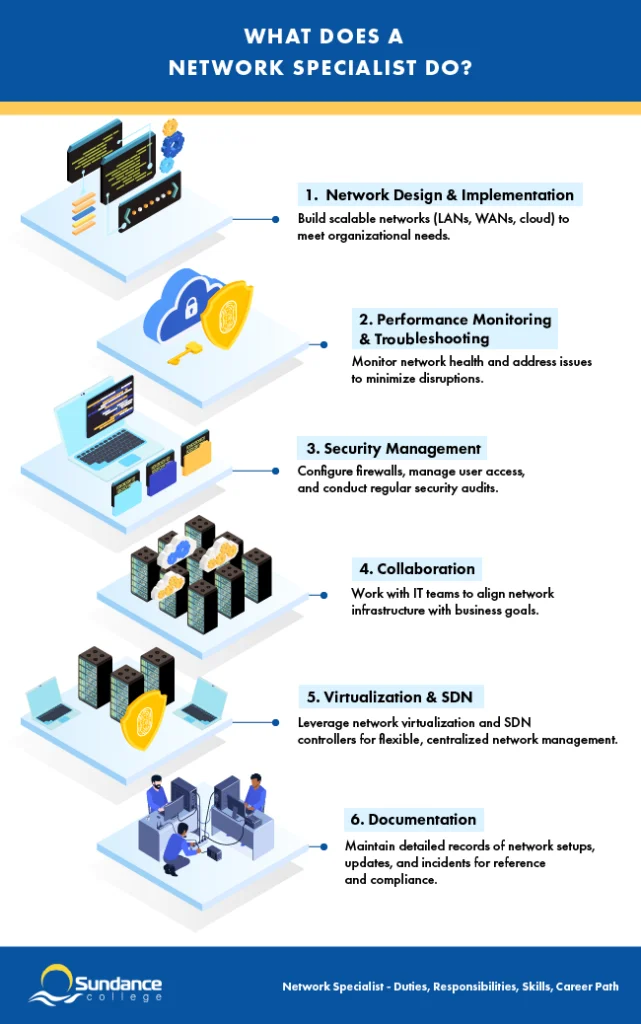Blog / Network Specialist – Duties, Responsibilities, Skills, Career Path
Network Specialist – Duties, Responsibilities, Skills, Career Path

Network Systems Manager Diploma
- Network Administrator
- Network Systems Administrator
- IT Support Technician
- Network Support Technician
Table of Contents
Imagine a business day without Wi-Fi, emails, or secure digital systems. It would be complete chaos, right? That’s why network specialists are so important. They set up and configure networks, troubleshoot network issues, and work with IT teams to keep sensitive data protected. Their expertise keeps websites running and digital platforms functional, supporting the daily operations organizations depend on. From finance to healthcare to business, network specialists are needed in a wide range of industries.
In this blog, we’ll break down the role of a network specialist, the skills they use, the tools that help them succeed, and the career paths that can lead to long-term growth in IT.
Listen to: What does a Network Specialist do?
What is a Network Specialist?
A network specialist is an IT professional responsible for designing, implementing, and maintaining the computer networks that organizations depend on for communication and data sharing.
These networks can range from small local area networks (LANs) to wide area networks (WANs) spanning multiple locations, as well as cloud systems and servers. In addition to building and managing these networks, they address technical issues to reduce downtime and support security measures to protect against cyber threats.
Core Responsibilities of a Network Specialist

Network support specialists are involved in every aspect of a network’s lifecycle, from planning and deployment to maintenance and optimization. Their core responsibilities include:
- Network Design and Implementation: They assess organizational needs and design network structures to support them. This involves setting up LANs, WANs, or even cloud-based networks, prioritizing scalability and reliability.
- Performance Monitoring and Troubleshooting: Network specialists continuously monitor network performance to detect and resolve issues quickly, minimizing disruptions.
- Security Management: Protecting the network is a top priority. They configure firewalls, manage user access, and perform regular security audits to prevent unauthorized access and data breaches.
- Collaboration: They often work closely with other IT professionals, such as system administrators and security teams, to align the network infrastructure with business objectives.
Network Specialist Daily Tasks and Duties
The responsibilities of a network specialist vary depending on the organization’s needs but typically include:
- Configuring and Maintaining Hardware: Setting up and managing routers, switches, and servers to provide consistent connectivity.
- Monitoring Network Performance: Assessing network health to identify and address potential issues before they escalate.
- Conducting Security Audits: Regularly reviewing the network for vulnerabilities and applying patches or updates as needed.
- User Support: Assisting employees with network-related issues, such as connectivity problems or accessing secure systems.
- Documentation: Keeping detailed records of network configurations, updates, and incidents for future reference and compliance purposes.
Skills Required for a Network Specialist

To succeed in this role, network specialists need a mix of technical and soft skills, including:
- Technical Expertise: A good grasp of network protocols (TCP/IP, DNS, DHCP), hardware (routers, switches, firewalls), software configuration, and LAN/WAN systems.
- Documentation: The ability to maintain accurate records of network configurations, updates, and incidents for compliance and future reference.
- Problem-Solving Abilities: Skill in diagnosing and resolving network issues to maintain uninterrupted operations.
- Analytical Thinking: The capability to evaluate complex network issues and devise optimal solutions.
- Communication Skills: Proficiency in explaining technical concepts in clear, actionable terms for non-technical team members.
Technologies and Tools Used by Network Specialists
Network systems specialists use various tools and technologies to design, implement, and maintain secure networks, including:
- Network Design and Architecture Tools:
Network specialists design networks with STP to prevent loops and routing protocols like IPv4/IPv6 to manage data flow. - Cloud Computing Tools:
Cloud platforms such as Azure boost network operations and optimize performance. - Network Security Tools:
Security measures like firewall management, malware protection, and vulnerability assessments, along with cryptography and PKI, help protect networks from cyber threats. - Network Management Tools:
They help monitor, diagnose, and resolve network issues, providing insights into performance, traffic, and potential problems. - Network Documentation Tools:
They help record network setups, track changes, and outline policies to maintain clarity and organization.

Career Path and Growth Opportunities for Network Specialists
Training in network systems prepares you for a variety of IT roles, offering flexibility to pursue positions that align with your career goals, not just as a network specialist. Some potential roles include:
- Network Administrator: Use network expertise to manage and oversee the daily operations of an organization’s network infrastructure.
- Network Support Analyst: Focus on troubleshooting and optimizing network performance to improve a business’s system reliability.
- Network Security Specialist: Protect networks from cyber threats, prevent breaches, and maintain compliance with data protection standards.
- IT Manager: Transition into leadership by guiding IT teams and developing strategies that align technology with organizational goals.
- IT Support Technician: Resolve hardware, software, and network issues to help maintain workflows across the organization.
As highlighted in the article, a network specialist’s role spans everything from designing resilient network infrastructures to safeguarding data against cyber threats. It’s a career that offers diverse challenges and opportunities for growth.
If you’re ready to explore a career in network system management, Sundance College’s Network Systems Manager program helps you develop the expertise and skills needed in the field. Fill out this form, and our team will contact you to discuss the program and your next steps.
Related Blogs
Subscribe for more career advice
Blog Categories
Share on:
